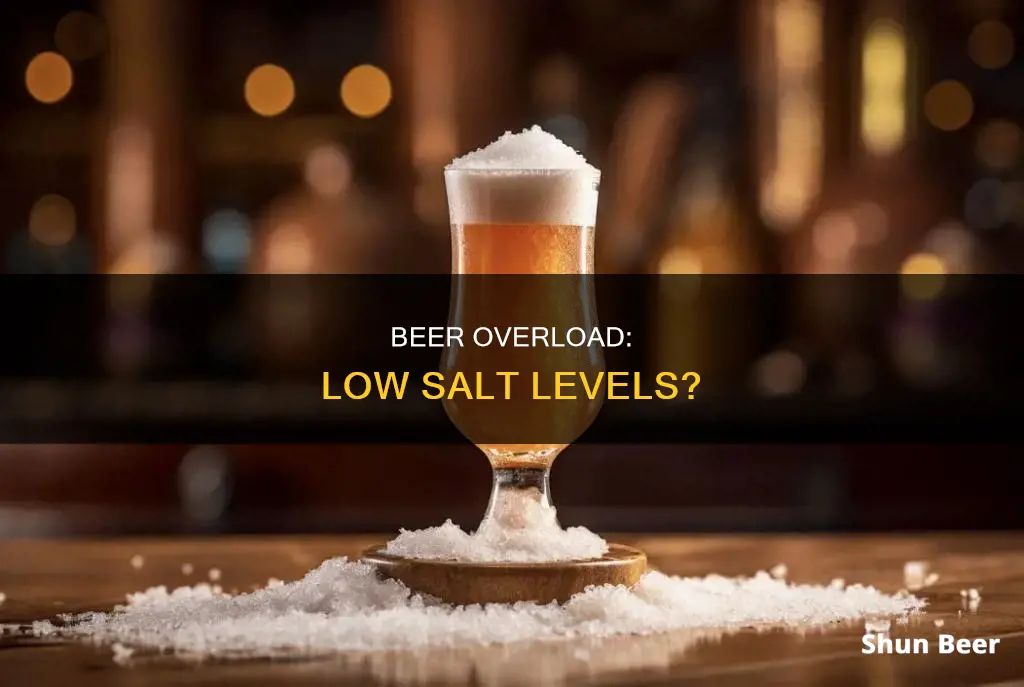
Beer potomania, or beer drinker's hyponatremia, is a condition caused by excessive beer consumption and inadequate sodium and protein-rich food intake. It results in abnormally low sodium levels in the blood, a condition known as hyponatremia. This occurs due to the high water and low sodium content in beer, leading to a lopsided water-to-salt ratio. The lack of sodium affects the body's ability to regulate water balance, causing fluid buildup in the cells and a dilution of sodium in the bloodstream. This can lead to serious neurological symptoms, including seizures and coma, and even death if left untreated. The treatment for beer potomania requires a delicate approach to slowly increase sodium levels and prevent complications such as osmotic demyelination syndrome (ODS).
| Characteristics | Values |
|---|---|
| What is Potomania? | A word that means drinking (poto) alcohol excessively (mania). |
| Beer Potomania | A condition in which the level of sodium in the bloodstream drops too low due to excessive beer consumption. |
| Hyponatremia | The medical term for an abnormally low sodium level in the blood. |
| Symptoms of Beer Potomania | Acutely altered mental state, muscle weakness, spasms, loss of energy, irritability, nausea, headache, seizures, coma. |
| Treatment of Beer Potomania | No food, drink, or anything by mouth except medicines for 24 hours, IV fluids if needed, regular monitoring of sodium levels, oxygen as needed. |
| Prevention of Beer Potomania | Eating healthy and nutritious meals, reducing or avoiding alcohol intake. |
What You'll Learn

Beer potomania and hyponatremia
Beer potomania is a condition caused by excessive beer consumption and poor dietary solute intake. It was first reported in 1972 and is characterised by fatigue, dizziness, and muscular weakness. The low solute content of beer, combined with the suppressive effect of alcohol on proteolysis, results in reduced solute delivery to the kidney. This, in turn, leads to dilutional hyponatremia, a condition where the body has more water than it can handle.
Hyponatremia is the medical term for an abnormally low level of sodium in the blood. Sodium is an important nutrient that helps regulate the balance of water in the body. When there is not enough sodium in the body, the kidneys cannot effectively clear excess fluids, leading to a build-up of fluid in the blood and causing cells to swell. This fluid build-up can occur rapidly and can be life-threatening if left untreated. Swelling in the brain can lead to seizures, coma, and even death.
The treatment of beer potomania requires a delicate approach. While administering sodium may seem like an obvious treatment, it can actually be dangerous. Rapid reversal of sodium levels can lead to neurological problems, including a condition known as osmotic demyelination syndrome (ODS). ODS can cause serious neurological issues such as spasms, severe mental impairment, and coma. Therefore, doctors recommend a slow and careful administration of sodium over 48 hours.
To prevent beer potomania, it is important to maintain a sufficient intake of healthy nutrients and reduce alcohol consumption. If illness prevents normal eating, meal-replacement drinks can be used to ensure adequate nutrient intake. It is also recommended to avoid binge drinking and to consume salty and protein-rich snacks when drinking beer or other alcoholic beverages.
Accutane and Alcohol: Is Beer Safe?
You may want to see also

Electrolyte balance
Beer potomania is characterised by abnormally low sodium levels in the blood, a condition called hyponatremia. This occurs due to the combination of excessive beer intake, which has a high water content and low sodium content, and poor nutritional intake, particularly a lack of sodium and protein-rich foods. The high water content in beer dilutes the sodium in the bloodstream, causing a rapid drop in sodium levels.
The symptoms of beer potomania include acutely altered mental state, muscle weakness, spasms or cramps, loss of energy or fatigue, irritability or restlessness, and in severe cases, coma. The severity of symptoms is often related to the severity of cerebral overhydration, which results from low sodium levels.
Treating beer potomania requires a delicate approach to avoid complications. Rapid correction of sodium levels can lead to neurological problems, including osmotic demyelination syndrome (ODS). Therefore, a slow and careful administration of sodium over 48 hours is recommended to prevent a rapid rise in sodium levels.
In addition to hyponatremia, excessive beer consumption can also lead to hypokalemia, or low potassium levels. Potassium is another important electrolyte that plays a crucial role in nerve and muscle function. Hypokalemia can cause muscle weakness, cardiac arrhythmias, and in severe cases, paralysis.
To maintain electrolyte balance and prevent beer potomania, it is important to consume beer in moderation and ensure adequate intake of sodium and potassium through a healthy diet. A balanced diet that includes fruits, vegetables, lean proteins, and healthy fats can help maintain normal electrolyte levels.
Drinking Beer with Propranolol: What You Need to Know
You may want to see also

Sodium deficiency
Excessive beer consumption can indeed lead to low levels of sodium in the blood, a condition known as hyponatremia or "beer potomania". This occurs when the level of sodium in the blood is lower than normal, causing water to move into the cells and making them swell. While most people get enough sodium from their diet, those who misuse alcohol may not, especially if they are consuming large quantities of beer and have poor overall nutrition.
Sodium is an important mineral that helps regulate the balance of water in the body and is needed for nerves, muscles, and other body tissues to function properly. When someone stops eating, their body breaks down fat and muscle for energy, usually providing enough sodium to keep the kidneys working. However, excessive beer consumption dilutes this sodium, making it ineffective.
Symptoms of sodium deficiency, or hyponatremia, can include:
- Acutely altered mental state
- Muscle weakness, spasms, or cramps
- Loss of energy or fatigue
- Irritability or restlessness
- Nausea and/or vomiting
- Dizziness when standing up
- Inability to wake (coma)
In severe cases, low sodium levels can lead to decreased consciousness, hallucinations, or even death. Therefore, it is important to seek medical attention if you are experiencing any of these symptoms.
The treatment for sodium deficiency depends on the underlying cause and severity of the condition. In some cases, increasing solute intake and correcting serum sodium levels may be enough to improve the condition. In other cases, a more comprehensive approach may be necessary, including intensive care and frequent monitoring of serum electrolytes. It is important to note that giving someone sodium may seem like an obvious treatment, but this can actually be dangerous and lead to neurological problems if done too rapidly.
Beer and Tramadol: A Safe Mix?
You may want to see also

Alcoholism and malnutrition
Alcoholism is a major problem globally, and it often goes hand in hand with malnutrition. Alcoholic beverages like beer are high in calories but low in nutritional value, leading to a situation where individuals consume a significant number of empty calories while neglecting essential nutrients. This can result in overall malnutrition or specific deficiencies in important micronutrients such as zinc, folate, and vitamins. The effects of alcohol on organ health are complex and influenced by various factors, including the amount and pattern of drinking.
Heavy alcohol consumption can interfere with normal nutrition in several ways. Firstly, it can reduce the absorption of certain nutrients like zinc and increase their loss through urinary excretion. Alcohol also affects intestinal permeability, leading to a "leakage" of nutrients from the blood into the gut lumen. This is further exacerbated by increased gut motility and impaired salt and water absorption. Additionally, alcohol inhibits the absorption of vitamins and nutrients through active transport processes, which can be crucial in precipitating specific nutrient deficiencies.
The consequences of alcohol-induced malnutrition can be severe. For example, zinc deficiency is associated with impaired wound healing, altered mental status, and immune dysfunction. Folate deficiency has been linked to anaemia, and vitamin deficiencies can lead to scurvy, abnormal bone metabolism, and skin photosensitivity, among other issues. Malnutrition also affects the severity of alcohol-induced organ damage, particularly in the liver and brain.
The gut plays a critical role in preventing the passage of toxins from the intestine into the bloodstream. Alcohol consumption alters the composition of the bacterial population in the gut (the gut microbiome) and increases intestinal permeability, leading to endotoxemia and liver injury. This disruption of the intestinal barrier function is influenced by the type of dietary fat consumed. Diets high in unsaturated fats, such as linoleic acid, in combination with alcohol, can have harmful effects on the intestine, blood, and liver.
Treating malnutrition in alcoholics is essential, and nutritional supplementation may be beneficial. For example, zinc supplementation has been shown to block or attenuate experimental organ injury and dysfunction in the gut, liver, lung, and brain. However, the treatment of malnutrition in alcoholics is complex and requires a careful approach to avoid further complications.
Paxlovid and Beer: Is It Safe to Mix?
You may want to see also

Treatment and prevention
If you are experiencing symptoms of beer potomania, it is important to seek medical attention. Doctors may decide not to give IV fluids with sodium and instead put you on a liquid-restricted diet for at least 24 hours. In some cases, this is enough for the body to expel extra fluids and build up sodium concentration.
If you are at risk of beer potomania, it is important to reduce your alcohol intake and ensure you are eating a sufficient amount of healthy nutrients. If you are unable to eat due to illness, try using a meal-replacement drink. It is also recommended to avoid binge drinking and, if you are planning to drink several beers, to also consume a salty and protein-rich snack, like beef jerky or nuts.
In cases of hyponatremia caused by other factors, such as kidney disease, liver disease, or certain medications, treatment options may include:
- Focusing on the condition(s) causing the hyponatremia, such as heart failure, cirrhosis, diabetes, or kidney failure
- Lowering the amount of liquids consumed
- Adjusting medication doses or switching to different medications
- Adjusting dialysis settings to remove more fluid
- Giving a dose of sodium through an intravenous (IV) line
- Adding a medication that helps the body remove extra water while holding on to sodium, such as tolvaptan or conivaptan (also known as aquaretics)
- Adding more salt to the diet (although this is not a common approach for people with kidney diseases)
Beer After Hernia Surgery: What You Need to Know
You may want to see also
Frequently asked questions
Beer Potomania, or "beer drinker's hyponatremia", is a condition caused by excessive beer consumption and inadequate sodium and protein-rich food intake. It leads to abnormally low sodium levels in the blood, a condition known as hyponatremia.
Symptoms of Beer Potomania include acutely altered mental state, muscle weakness, spasms or cramps, fatigue, irritability, restlessness, nausea, vomiting, headache, seizures, and coma. These symptoms are often associated with binge drinking and poor nutritional intake.
Beer has a high water content and a low sodium content. When individuals with chronically low sodium levels binge on beer, the kidneys can become dysfunctional, leading to fluid buildup in the cells. The excess water dilutes the sodium in the bloodstream, causing a rapid and severe drop in sodium levels.
Treating Beer Potomania requires a careful and delicate approach. Rapid correction of sodium levels can lead to neurological problems, such as osmotic demyelination syndrome (ODS). Treatment typically involves restricting fluids and food for a period, closely monitoring sodium levels, and gradually increasing sodium levels over 48 hours.
Beer Potomania can be prevented by maintaining a healthy and nutritious diet, ensuring adequate sodium and protein intake, and reducing or avoiding excessive alcohol consumption. Seeking help for alcohol addiction is crucial to prevent life-threatening complications.







